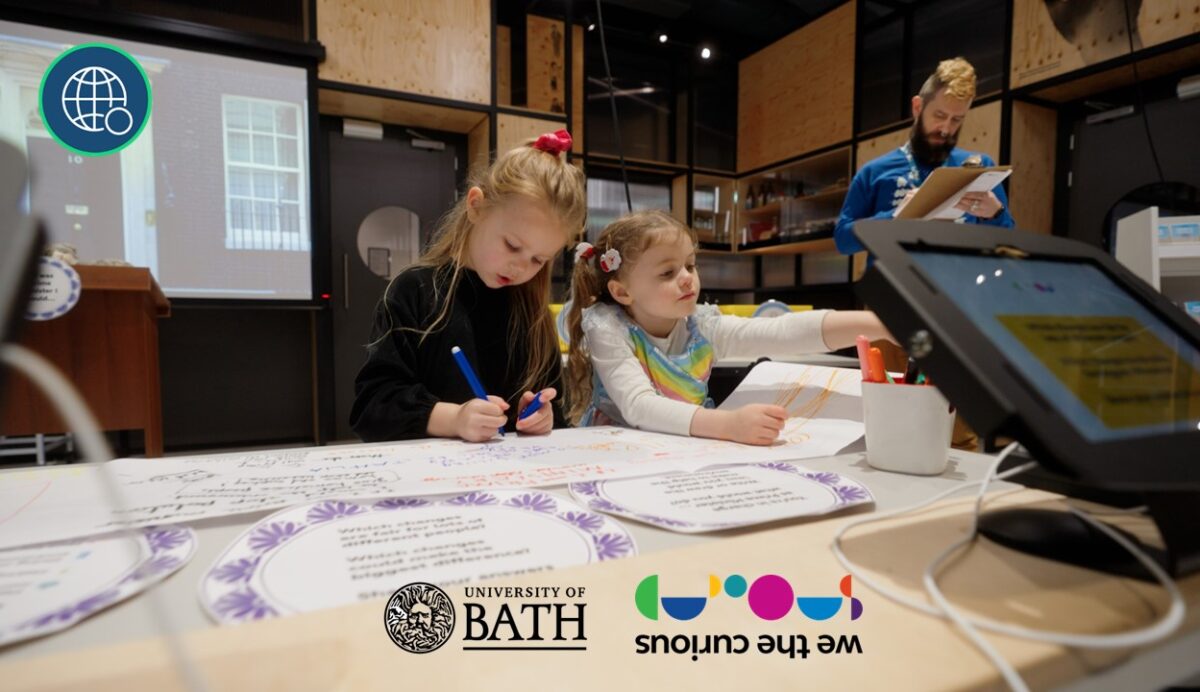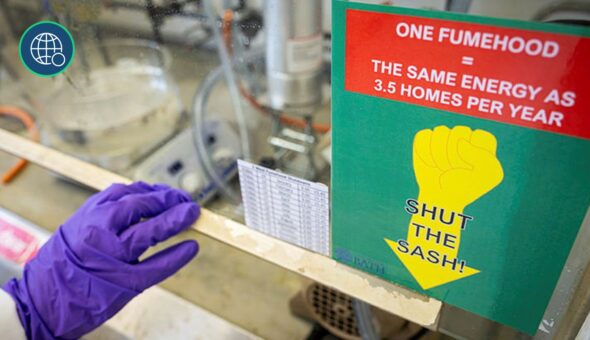Image credit: Woven Films
The University of Bath is committed to fostering meaningful connections between academia and society, and public engagement is an integral part of the University’s mission as a civic institution. It is also an area I have been passionate about throughout my research career, and it is a pleasure in my current position to hear about the exciting public engagement projects being led by our colleagues across the University.
In my most recent blog post I am pleased to be showcasing an innovative research project, which is engaging the public in how policies aiming to reduce high emission foods might affect what we put on our plates.
The project is led by Department of Psychology researchers Thalia Gjersoe and Katharine Lee in collaboration with ‘We the Curious’, a science and arts centre and educational charity in Bristol.
I have invited Thalia, Katharine and colleagues from We the Curious to share their reflections on their collaboration, and why engaging the public in research is so important.
Kind regards,
Sarah
Thalia Gjersoe and Katharine Lee, University of Bath
Can you give a short overview of the project including the main goals and objectives?
The decisions we make about our diets are increasingly complex. Not only do we need to worry about preferences, health, cost, and convenience, we are increasingly being asked to consider the environmental impact of what we eat. Children and young people have a fair amount of autonomy over their diets, and we are interested in how families are navigating these complex decisions together.
Together with We the Curious, we have co-created ‘Plates for the Planet’, where visitors interact with what their dietary world might look like if the government introduced different policies to reduce the environmental impact of food. Visitors explore what impact taxes, subsidies, changing dietary options, and environmental labelling might have on places they know well, such as restaurants, school canteens, and supermarkets. They are introduced to different perspectives and asked to consider what might be fair and effective.
How did the collaboration come about?
Thalia started working with We the Curious in 2005 as their resident ‘Brain Expert,’ and has had a productive relationship with them ever since. In 2021 they co-created ‘Robot Revolution’ an interactive event that had children using robots to win football matches and explored the extent to which children of different ages thought of robots as having human-like thoughts and feelings.
When we got excited about working with the public to understand how families were discussing these issues and what research they felt was important to do in this area, We the Curious seemed like the perfect partner. We were fortunate that they were curating the Open City Lab agenda for the year and really welcomed the idea we were proposing.
Were there any particular challenges you faced setting up this collaboration, or implementing the project? How did you overcome them?
One of the most challenging aspects from our side was thinking about how to make a potentially rather dry topic engaging and interesting. Luckily, We the Curious are experts at creating fun and interactive activities that engage audiences of all ages and have done an amazing job of this.
What are the next steps for this research?
We have built in some mechanisms for capturing visitors’ thoughts and ideas. These, along with data from a small interview study that we will be running at We the Curious will be used to help develop and shape our research programme.
Perspective from colleagues at We The Curious
How long has the project been running for, and what has the response from the public been so far?
Plates for the Planet has been running since February 2025. Visitors have really engaged with the programme and have been enjoying making their school meals and reflecting on how they’d feel if they had to swap their foods. We’ve also had mock parliamentary elections.
We have run several Open City Research programmes with audiences contributing to research including on topics such as AI, Robotics, Health data and Psychology, but what is different about Plates for the Planet is that we are asking visitors to contribute ideas to the direction for research and at the same time sharing the link between research and policy decisions. This is a new step in supporting our audiences to see how they might influence social change through both science research and policy.
What is the Open City Lab and why was it set up?
Open City Lab is where we do most of our work with getting the public involved in research. We do this by introducing people to the whole research process, from ideas generation, ethics and experimenting, to data collection and analysing, as well as shaping the direction of future research.
We recognise that historically science research hasn't benefited everyone equally across society. We believe that by creating interactive experiences that support a broader range of people to influence research we can improve the quality of research and make the outcomes of research more relevant to everyone.
As a charity we work with our local communities to help create a future where everyone is included, curious and inspired to build a better world together. By working with researchers, we ensure that people can really have an impact on the research as it is happening.
What have you got planned next in the Lab?
It takes time for external partners to get to know our audiences and understand the value that they have in shaping research. This has led us to invest in long term relationships with partners that might span several years. However, we are also keen to diversify the people we work with and the disciplines that we represent within the Open City Lab. So, in our next programme we will be working with five new researchers across different disciplines on a totally new format.
We’re also already working on our summer holiday programme where visitors will explore different research skills to solve puzzles in an island odyssey
Do you have any advice for researchers wanting to forge relationships with external partners such as yourselves?
Come with an open mind, be prepared for new approaches and ways of thinking, and for the public to have a whole range of responses to your work. Thalia and Kath have been great because they’re so interested and responsive to how the public have been engaging with the project.
As with all relationships listening, mutual respect and building up trust over time. We have learned a huge amount from partners including Thalia and Kath who were willing to take a risk with new Public Engagement approaches to innovate alongside us. We have developed a series of ethical principles in how we work that help explain our approach.
Find out more
If you are interested in finding out more about the project, why not visit the exhibit at https://www.wethecurious.org/ . The ‘Plates for the Planet’ exhibit is open until 6th July 2025.
And if you are interested in engaging the public in your research, why not get in touch with the Public Engagement Unit, who provide support for high-quality involvement and engagement with research : public-engagement@bath.ac.uk



